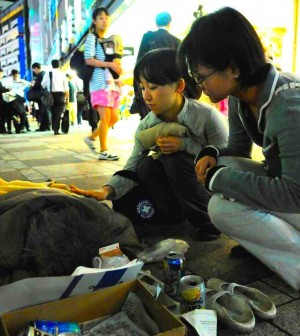- Belgium comes to Yamashita Park
- Residential Villa in Phuket Entices Remote Workers With Long-Stay Rates
- Rare pieces of French glass art at the Mirai Museum of Art
- Feast on fresh fish and seafood at the 2024 ‘Sakana’ Festival
- Would you like to ride in a Louis Vuitton gondola lift?
- Naked Snow Aquarium
- Festive lights at Yomiuriland will get you feeling the holiday vibes
HOMELESSNESS in Japan

According to the 2014 statistics by the Ministry of Health, Labour and Welfare, there are 7,508 homeless people in Japan of which up to 6,929 are men. It’s hard to believe that in our prosperous host country, the most fundamental human needs like food, medication and having a roof over the head are real issues. It’s a tough reality.
Homelessness in Japan is viewed negatively. These people get little to no empathy from the community for choosing to retreat from society on their own volition.
But international humanitarian non-profit organization ‘Doctors of the World’ argues that this is not so.
“The Doctors of the World can testify that this is not the case, We aim to disseminate factual information about what’s really going on. In working with medical volunteers and researchers, the non-profit organization found out that over 60% of homeless people are suffering from mental disorders such as depression, schizophrenia or low I.Q. This means that without help and support, they are not able to reach out on their own. Another thing is that most of them are unable to apply for government aid because the procedure is far too complicated and overwhelming,” Marjorie Meyssignac of Doctors of the World in Japan tells Tokyo families.
“For 5 straight years, the Doctors of the World, has been providing medical care to vulnerable people in the country through its Tokyo Project. The project with long-term objectives was started to assist the homeless people suffering from mental disorders with the aim of reintegrating them back into the community. The Doctors of the World collaborates with NPO partners made up of general and mental healthcare professionals in providing weekly medical consultations and check-ups held in Ikebukuro.”
Having chronic depression, no self-esteem, no support network, and no interaction can spin a life out of control.
Sports instructors, chefs and other volunteers put in hours of unpaid work to provide these homeless people a range of activities from physical exercises (volleyball, yoga, stretching, etc) and arts and crafts workshop to cooking and bread-making classes. There are occasional excursions too.
“These workshops have been created to get homeless people back to interacting with other people again. In fact, there are some who haven’t had a social exchange in years,” informs Meyssignac.
The Japanese government is not without welfare programs to tackle this social issue. The problem seems to come from a tedious application process (for welfare benefits) that drives beneficiaries away instead of enabling them to exercise their rights, which is, according to Doctors of the World, a ‘failure.’
“This is why one of the organization’s advocacy projects, the Futon Project, aims to get the Japanese government and city wards to study proposed application procedures in claiming for allowances during the New Year holiday season and propose alternatives and new schemes like Housing First.”
There are many circumstances that lead to the episode of homelessness. But being without a roof seems to to have the most major consequences.
Despite the global economic crisis, a recent innovation in human service programs and social policy to end homelessness known as ‘Housing First’ created a stir in many cities around the world. Housing First is a concept to help people find independent housing (not emergency shelter) immediately before any other issues like mental treatment or finding a job are addressed. Other forms of assistance continues once they are housed. The new approach, first introduced in the United States in 2010 through U.S. President Obama’s Opening Doors project for its homeless war veterans, delivered outstanding and permanent results which doing the opposite rarely solved.
The works of the Doctors of the World will be aired in a televised documentary on homelessness in Japan on TBS and NHK hoping to increase public awareness and raise money to help solve the social issues grappling Japan.
❧❧❧❧❧❧❧❧❧❧❧ ❧❧❧❧❧❧❧❧❧❧❧ ❧❧❧❧❧❧❧❧❧❧❧ ❧❧❧❧❧❧❧❧❧❧❧ ❧❧❧❧❧❧❧❧❧❧❧
No. Of Homeless PEOPLE IN JAPAN Tokyo 1,581 (23 wards) Others 5,927
❧❧❧❧❧❧❧❧❧❧❧ ❧❧❧❧❧❧❧❧❧❧❧ ❧❧❧❧❧❧❧❧❧❧❧ ❧❧❧❧❧❧❧❧❧❧❧ ❧❧❧❧❧❧❧❧❧❧❧
Doctors of the World needs your support: To get involved with the NGO’s activities or participate in upcoming events, go to:
http://www.mdm.or.jp/english/ or















